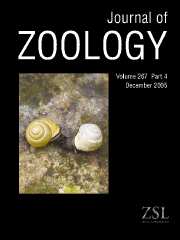Article contents
Statistical power analysis: application to an investigation of dinosaur thermal physiology
Published online by Cambridge University Press: 27 February 2001
Abstract
It has been postulated that the variation in an animal's body temperature during different phases of bone deposition can be estimated from the variation in the ratio of two oxygen isotopes in phosphate recovered from its fossil. Using data from a fossil Tyrannosaurus rex skeleton, the previous researchers failed to reject the null hypothesis that the variation found in bones from the body core is significantly less than that found in the extremities; they also failed to reject the null hypothesis that the coldest and hottest parts of the body differed by less than 4 °C. This suggests that either both null hypotheses are true, or that they are false but the statistical tests used were not powerful enough to detect this. Here I use calculation of confidence intervals to differentiate between these two alternatives. In the first case, I find that the data are consistent with the variance in both the core and the extremity being up to 2.5 times that of the other. In the second case, I show that observations are consistent with temperature differences ranging from 2.6 °C to 6.4 °C. Hence, neither case provides any real support for the hypothesis that bone deposition in this specimen occurred under essentially thermostable conditions.
- Type
- Research Article
- Information
- Copyright
- 2000 The Zoological Society of London
- 4
- Cited by


